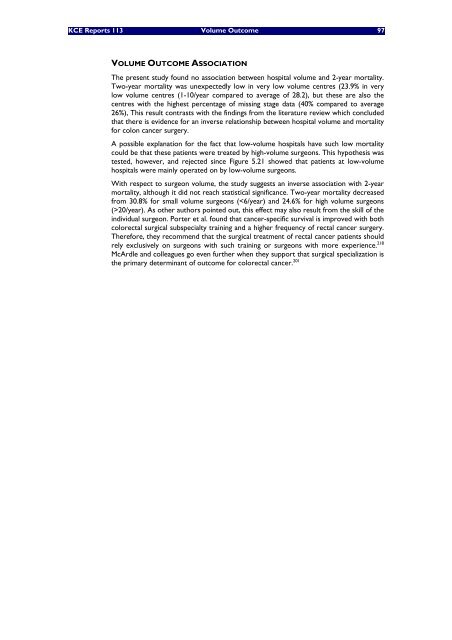Het volume van chirurgische ingrepen en de impact ervan op ... - KCE
Het volume van chirurgische ingrepen en de impact ervan op ... - KCE
Het volume van chirurgische ingrepen en de impact ervan op ... - KCE
You also want an ePaper? Increase the reach of your titles
YUMPU automatically turns print PDFs into web optimized ePapers that Google loves.
<strong>KCE</strong> Reports 113 Volume Outcome 97<br />
VOLUME OUTCOME ASSOCIATION<br />
The pres<strong>en</strong>t study found no association betwe<strong>en</strong> hospital <strong>volume</strong> and 2-year mortality.<br />
Two-year mortality was unexpectedly low in very low <strong>volume</strong> c<strong>en</strong>tres (23.9% in very<br />
low <strong>volume</strong> c<strong>en</strong>tres (1-10/year compared to average of 28.2), but these are also the<br />
c<strong>en</strong>tres with the highest perc<strong>en</strong>tage of missing stage data (40% compared to average<br />
26%), This result contrasts with the findings from the literature review which conclu<strong>de</strong>d<br />
that there is evid<strong>en</strong>ce for an inverse relationship betwe<strong>en</strong> hospital <strong>volume</strong> and mortality<br />
for colon cancer surgery.<br />
A possible explanation for the fact that low-<strong>volume</strong> hospitals have such low mortality<br />
could be that these pati<strong>en</strong>ts were treated by high-<strong>volume</strong> surgeons. This hypothesis was<br />
tested, however, and rejected since Figure 5.21 showed that pati<strong>en</strong>ts at low-<strong>volume</strong><br />
hospitals were mainly <strong>op</strong>erated on by low-<strong>volume</strong> surgeons.<br />
With respect to surgeon <strong>volume</strong>, the study suggests an inverse association with 2-year<br />
mortality, although it did not reach statistical significance. Two-year mortality <strong>de</strong>creased<br />
from 30.8% for small <strong>volume</strong> surgeons (20/year). As other authors pointed out, this effect may also result from the skill of the<br />
individual surgeon. Porter et al. found that cancer-specific survival is improved with both<br />
colorectal surgical subspecialty training and a higher frequ<strong>en</strong>cy of rectal cancer surgery.<br />
Therefore, they recomm<strong>en</strong>d that the surgical treatm<strong>en</strong>t of rectal cancer pati<strong>en</strong>ts should<br />
rely exclusively on surgeons with such training or surgeons with more experi<strong>en</strong>ce. 218<br />
McArdle and colleagues go ev<strong>en</strong> further wh<strong>en</strong> they support that surgical specialization is<br />
the primary <strong>de</strong>terminant of outcome for colorectal cancer. 201

















